外研版英语七年级下册复习Module 1 Lost and Found 课件 (共37张PPT)
文档属性
| 名称 | 外研版英语七年级下册复习Module 1 Lost and Found 课件 (共37张PPT) | 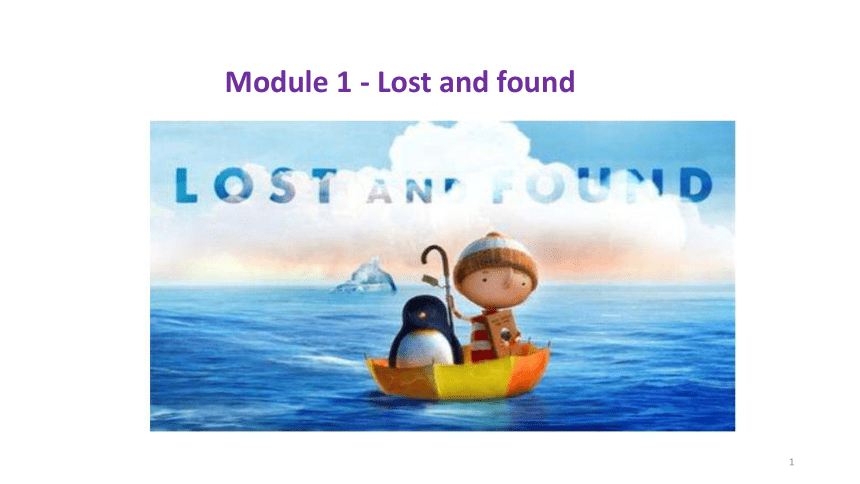 | |
| 格式 | zip | ||
| 文件大小 | 1.4MB | ||
| 资源类型 | 教案 | ||
| 版本资源 | 外研版 | ||
| 科目 | 英语 | ||
| 更新时间 | 2020-05-20 15:48:30 | ||
图片预览


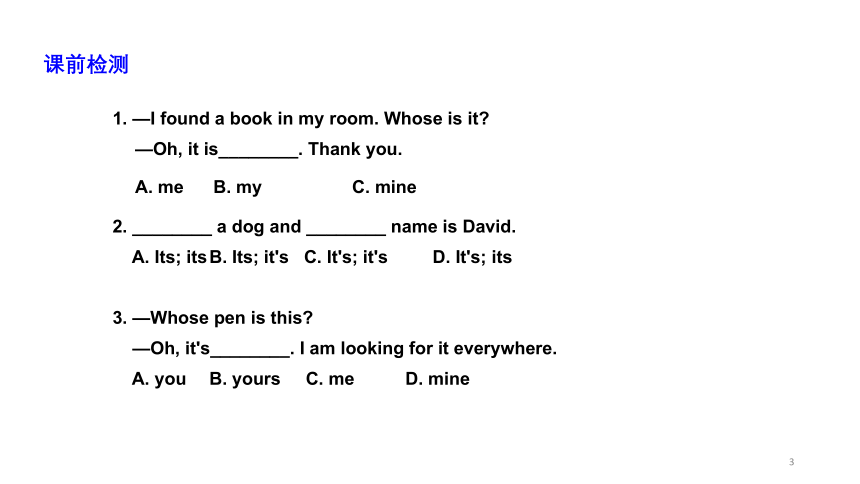
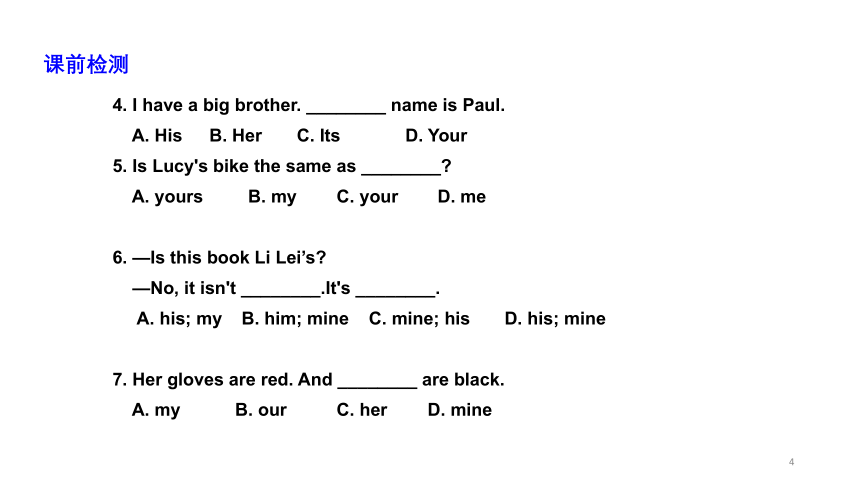

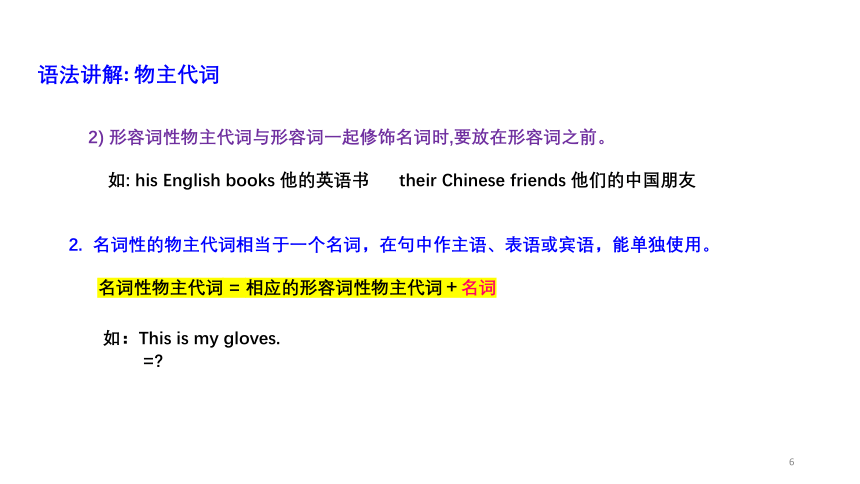
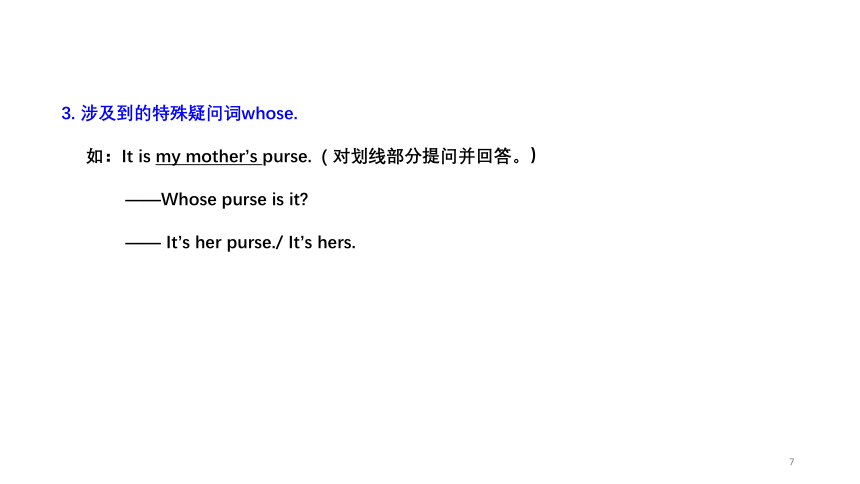

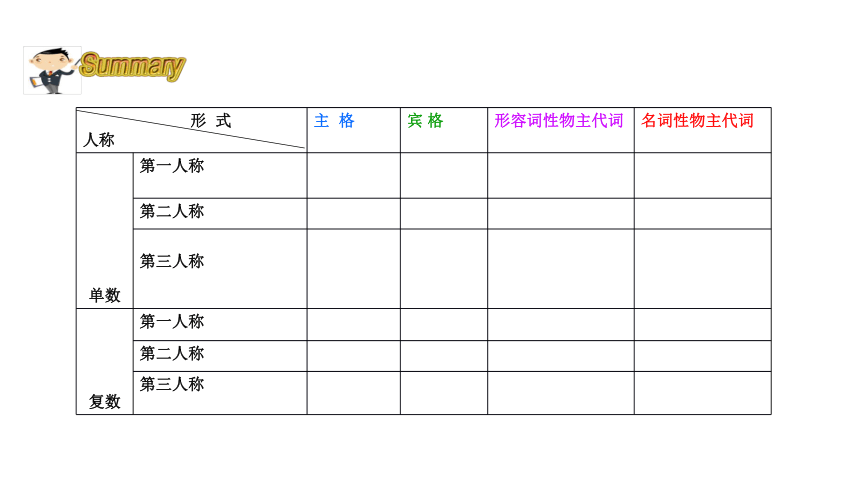
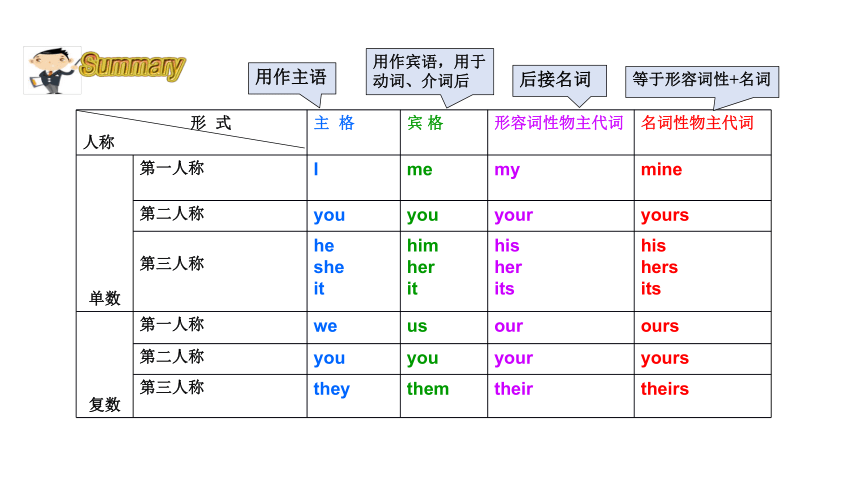

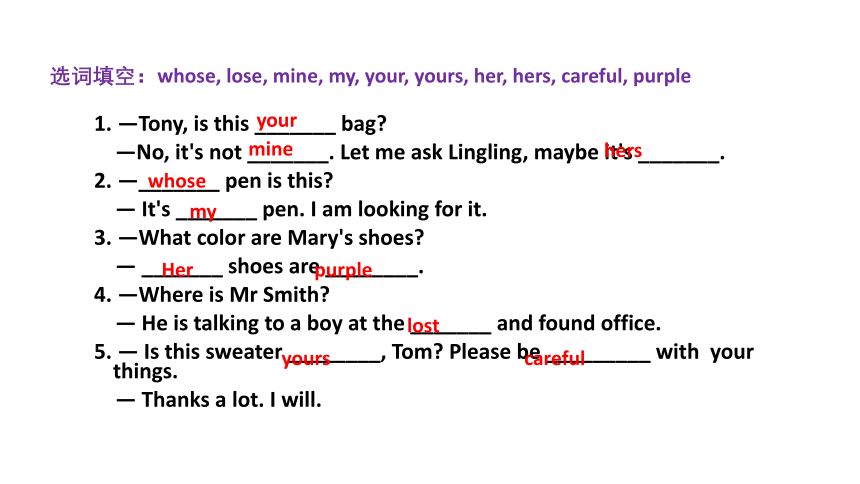
文档简介
(共37张PPT)
null
Module 1 - Lost and found
null
Task 1 Grammar
人称代词和物主代词
null
1. —I found a book in my room. Whose is it?
—Oh, it is________. Thank you.
A. me B. my C. mine
2. ________ a dog and ________ name is David.
A. Its; its B. Its; it's C. It's; it's D. It's; its
3. —Whose pen is this?
—Oh, it's________. I am looking for it everywhere.
A. you B. yours C. me D. mine
课前检测
null
4. I have a big brother. ________ name is Paul.
A. His B. Her C. Its D. Your
5. Is Lucy's bike the same as ________?
A. yours B. my C. your D. me
6. —Is this book Li Lei’s?
—No, it isn't ________.It's ________.
A. his; my B. him; mine C. mine; his D. his; mine
7. Her gloves are red. And ________ are black.
A. my B. our C. her D. mine
?
课前检测
null
物主代词分形容词性物主代词与名词性物主代词。
1. 形容词性物主代词相当于一个形容词, 表“…的”,其后一定要接名词。
如:my wallet; your crayon; his eraser; her watch
注意点:
1)如果名词前有形容词性物主代词,就不能同时用冠词(a, an, the)或指示代词(this, that, these, those)修饰此名词。
This is my pen. This is my a pen.
This is a pen. This is a my pen.
语法讲解: 物主代词
null
2) 形容词性物主代词与形容词一起修饰名词时,要放在形容词之前。
如: his English books 他的英语书 their Chinese friends 他们的中国朋友
2. 名词性的物主代词相当于一个名词,在句中作主语、表语或宾语,能单独使用。
名词性物主代词 = 相应的形容词性物主代词+名词
如:This is my gloves.
=?
语法讲解: 物主代词
null
3. 涉及到的特殊疑问词whose.
如:It is my mother’s purse. ( 对划线部分提问并回答。)
——Whose purse is it?
—— It’s her purse./ It’s hers.
null
练习:
这是我的照相机。
对划线部分提问?
用形容词性物主代词回答
用名词性物主代词回答
形 式
人称 主 格 宾 格 形容词性物主代词 名词性物主代词
单数 第一人称
第二人称
第三人称
复数 第一人称
第二人称
第三人称
形 式
人称 主 格 宾 格 形容词性物主代词 名词性物主代词
单数 第一人称 I me my mine
第二人称 you you your yours
第三人称 he
she
it him
her
it his
her
its his
hers
its
复数 第一人称 we us our ours
第二人称 you you your yours
第三人称 they them their theirs
用作主语
用作宾语,用于动词、介词后
后接名词
等于形容词性+名词
1. —Tony, is this _______ bag?
—No, it's not _______. Let me ask Lingling, maybe it's _______.
2. —_______ pen is this?
— It's _______ pen. I am looking for it.
3. —What color are Mary's shoes?
— _______ shoes are ________.
4. —Where is Mr Smith?
— He is talking to a boy at the _______ and found office.
5. — Is this sweater ________, Tom? Please be _________ with your things.
— Thanks a lot. I will.
选词填空:whose, lose, mine, my, your, yours, her, hers, careful, purple
1. —Tony, is this _______ bag?
—No, it's not _______. Let me ask Lingling, maybe it's _______.
2. —_______ pen is this?
— It's _______ pen. I am looking for it.
3. —What color are Mary's shoes?
— _______ shoes are ________.
4. —Where is Mr Smith?
— He is talking to a boy at the _______ and found office.
5. — Is this sweater ________, Tom? Please be _________ with your things.
— Thanks a lot. I will.
your
mine
hers
whose
my
Her
purple
lost
yours
careful
选词填空:whose, lose, mine, my, your, yours, her, hers, careful, purple
null
Task 2 Words
词汇
Words
蜡笔
橡皮檫
手套
钱包
手表
谁的
失去
发现
我的
你们的
录音带
紫色的
她的
仔细的
照相机
电话
丢下
飞机
出租车
为什么
机场
百
千
奇怪的
香肠
Words
蜡笔
橡皮檫
手套
钱包
手表
谁的
失去
发现
我的
你们的
录音带
紫色的
她的
crayon
eraser
glove
wallet
watch
whose
lose
find
mine
yours
tape
purple
hers
仔细的
照相机
电话
丢下
飞机
出租车
为什么
机场
百
千
奇怪的
香肠
careful
camera
phone
leave
plane
taxi
why
airport
hundred
thousand
strange
sausage
选词填空:
phone, hundreds of, in a hurry, look for, at the airport
1. Mr. Green’s son is ill, he takes him to the hospital ________.
2. The farmer keeps _____________ pigs on his farm.
3. The man's wallet is lost, he _____________ it.
4. Mike has a nice ________, he often uses it to call his pen friend.
5. Mr. Smith is waiting for his friends ________.
in a hurry
hundreds of
is looking for
phone
at the airport
选词填空:
phone, hundreds of, in a hurry, look for, at the airport
1. Mr. Green’s son is ill, he takes him to the hospital ________.
2. The farmer keeps _____________ pigs on his farm.
3. The man's wallet is lost, he ____________ it.
4. Mike has a nice ________, he often uses it to call his pen friend.
5. Mr. Smith is waiting for his friends ________.
null
Task 3 Phrase
短语
Phrases
失物招领箱
欢迎回到
首先
小心
从现在起
与某人谈话
寻找
上车
匆匆忙忙的
某物留在某地
在机场
数百的
此时
lost and found box
welcome back
first of all
be careful with
from now on
talk to sb
look for
get on
in a hurry
leave sth someplace
at the airport
hundreds of (辨析单独使用的情况)
at the moment
lost and found 失物招领
e.g. in the lost and found box 在失物招领箱里
at the lost and found office 在失物招领处
短语细讲
2. welcome back to+地点名词 欢迎回到...
e.g. Welcome back to school.
welcome to +表示地点的名词 欢迎来到某地
e.g. Welcome to Beijing.
welcome +表示地点的副词
e.g. Welcome home! 欢迎回家
(home /here/there 是地点副词,前面不与介词连用。)
短语细讲
3. from now on 从现在开始
from then on 从那时开始
短语细讲
4. talk to sb 和某人说话(侧重主动说)
talk with sb 和某人说话(侧重两人都说)
talk about sth 谈论某事
say 说,强调说的内容 e.g. He can’t say a word.
speak 说,后面可以直接加语言
e.g. speak English/Chinese
My sister can speak three languages.
speak to sb 和某人说话
tell 告诉
tell sb. sth=tell sth to sb.告诉某人某事
tell sb. to do sth.告诉某人去做某事
tell sb. not to do sth.告诉某人别做某事
短语细讲
5. look for 寻找(强调过程,不一定找到)
e.g. I’m looking for my dog.
find 找到 (强调结果)
e.g. I can’t find it.
find out +事情(经过努力)查明,弄清某事
短语细讲
look over仔细检查
look after =take care of 照顾
look like 看起来像
look through 浏览
look up 查阅,查考
look forward to doing sth. 期盼,期待
6. get on the bus 上公交车
get off the bus 下公交车
get in the car
get out of the car
?
7. in a hurry 匆匆忙忙
hurry up=come on 快点儿,赶紧
hurry to do sth 匆忙去做某事
(there’s)no hurry 不忙,不必着急
短语细讲
8. hundred、thousand、 million、billion的用法:
(1).前面有具体数词时,不变复数: two thousand mobile phones
(2).后面加of时,本身变复数: hundreds of people
短语细讲
9. at the moment=at this moment=now 此时此刻,现在
at that moment=then 在那时
短语细讲
null
Task 4 Sentences
句子
Everyone, please be careful with your things from now on.
2. People often lose things when they are travelling or when they are in a hurry.
3. They leave things on planes, on trains, on buses and in taxis.
1. Everyone, please be careful with your things from now on.
从现在开始,请每个人小心保管自己的物品。
2. People often lose things when they are travelling or when they are in a hurry.
人们在旅行中或是匆匆忙忙时经常丢东西。
3. They leave things on planes, on trains, on buses and in taxis.
他们把东西落在飞机、火车、公交车和出租车上。
leave v.
1. 离开
leave+地点: 离开某地
leave for+地点: 出发去某地
2. 丢下,遗忘
leave sth+地点状语 把某物落在某地
3. n.假期,休假
I have to ask for a three days’ leave. 我得请三天假。
4. That’s why there are lost and found offices at airports and stations.
5. Hundreds of people come here every day.
4. That’s why there are lost and found offices at airports and stations.
这就是机场和火车站都有失物招领处的原因。
That’s why 是…的原因,后面加结果。
eg. He got up late, that’s why he was late for work.
结果 原因
5. Hundreds of people come here every day.
每天都有许多人来到这里。
hundred、thousand、 million、billion的用法:
(1).前面有具体数词时,不变复数: two thousand mobile phones
(2).后面加of时,本身变复数: hundreds of people
Hello, everybody. My name is Jimmy Green. I am thirty years old. I am from New York. I work at a lost and found office in New York.
At the lost and found office, there are some different things. Let's have a look.
Look!There are five wallets on the table. When you open the wallets, you can find some money in two of them. There is a shelf behind the table. There are some mobile phones and cameras on the shelf. Maybe we have about one hundred cameras. Are these your cameras? Come here and have a look. You miss your camera. Maybe your camera misses you, too. After finding it, you can take it home.
It is open from 9:00 a. m.to 5:00 p. m. from Monday to Friday. It is also open at noon. Welcome here!Maybe you can find what you have lost.
38. In the lost and found office, there are some things EXCEPT___.
A. wallets B. mobile phones C. cameras D. computers
39. Where are the mobile phones?
A. On the table. B. Under the table.
C. On the shelf. D. Under the shelf.
40. What does the underlined word “miss” mean in Chinese?
A. 错过 B. 想念 C. 丢失 D. 购买
41. You can go to the lost and found office________.
A. at 8:00 on Monday B. at 10:00 on Sunday
C. at 9:30 on Saturday D. at noon on Friday
42. After reading the passage, we can know________.
A. Jimmy Green is twenty years old
B. Jimmy Green is from London
C. Jimmy Green works in New York
D. Jimmy Green has a camera
七、38.D 39. C 40. B 41. D 42. C
null
复习笔记
2. 完成相关练习题
课后作业
null
Module 1 - Lost and found
null
Task 1 Grammar
人称代词和物主代词
null
1. —I found a book in my room. Whose is it?
—Oh, it is________. Thank you.
A. me B. my C. mine
2. ________ a dog and ________ name is David.
A. Its; its B. Its; it's C. It's; it's D. It's; its
3. —Whose pen is this?
—Oh, it's________. I am looking for it everywhere.
A. you B. yours C. me D. mine
课前检测
null
4. I have a big brother. ________ name is Paul.
A. His B. Her C. Its D. Your
5. Is Lucy's bike the same as ________?
A. yours B. my C. your D. me
6. —Is this book Li Lei’s?
—No, it isn't ________.It's ________.
A. his; my B. him; mine C. mine; his D. his; mine
7. Her gloves are red. And ________ are black.
A. my B. our C. her D. mine
?
课前检测
null
物主代词分形容词性物主代词与名词性物主代词。
1. 形容词性物主代词相当于一个形容词, 表“…的”,其后一定要接名词。
如:my wallet; your crayon; his eraser; her watch
注意点:
1)如果名词前有形容词性物主代词,就不能同时用冠词(a, an, the)或指示代词(this, that, these, those)修饰此名词。
This is my pen. This is my a pen.
This is a pen. This is a my pen.
语法讲解: 物主代词
null
2) 形容词性物主代词与形容词一起修饰名词时,要放在形容词之前。
如: his English books 他的英语书 their Chinese friends 他们的中国朋友
2. 名词性的物主代词相当于一个名词,在句中作主语、表语或宾语,能单独使用。
名词性物主代词 = 相应的形容词性物主代词+名词
如:This is my gloves.
=?
语法讲解: 物主代词
null
3. 涉及到的特殊疑问词whose.
如:It is my mother’s purse. ( 对划线部分提问并回答。)
——Whose purse is it?
—— It’s her purse./ It’s hers.
null
练习:
这是我的照相机。
对划线部分提问?
用形容词性物主代词回答
用名词性物主代词回答
形 式
人称 主 格 宾 格 形容词性物主代词 名词性物主代词
单数 第一人称
第二人称
第三人称
复数 第一人称
第二人称
第三人称
形 式
人称 主 格 宾 格 形容词性物主代词 名词性物主代词
单数 第一人称 I me my mine
第二人称 you you your yours
第三人称 he
she
it him
her
it his
her
its his
hers
its
复数 第一人称 we us our ours
第二人称 you you your yours
第三人称 they them their theirs
用作主语
用作宾语,用于动词、介词后
后接名词
等于形容词性+名词
1. —Tony, is this _______ bag?
—No, it's not _______. Let me ask Lingling, maybe it's _______.
2. —_______ pen is this?
— It's _______ pen. I am looking for it.
3. —What color are Mary's shoes?
— _______ shoes are ________.
4. —Where is Mr Smith?
— He is talking to a boy at the _______ and found office.
5. — Is this sweater ________, Tom? Please be _________ with your things.
— Thanks a lot. I will.
选词填空:whose, lose, mine, my, your, yours, her, hers, careful, purple
1. —Tony, is this _______ bag?
—No, it's not _______. Let me ask Lingling, maybe it's _______.
2. —_______ pen is this?
— It's _______ pen. I am looking for it.
3. —What color are Mary's shoes?
— _______ shoes are ________.
4. —Where is Mr Smith?
— He is talking to a boy at the _______ and found office.
5. — Is this sweater ________, Tom? Please be _________ with your things.
— Thanks a lot. I will.
your
mine
hers
whose
my
Her
purple
lost
yours
careful
选词填空:whose, lose, mine, my, your, yours, her, hers, careful, purple
null
Task 2 Words
词汇
Words
蜡笔
橡皮檫
手套
钱包
手表
谁的
失去
发现
我的
你们的
录音带
紫色的
她的
仔细的
照相机
电话
丢下
飞机
出租车
为什么
机场
百
千
奇怪的
香肠
Words
蜡笔
橡皮檫
手套
钱包
手表
谁的
失去
发现
我的
你们的
录音带
紫色的
她的
crayon
eraser
glove
wallet
watch
whose
lose
find
mine
yours
tape
purple
hers
仔细的
照相机
电话
丢下
飞机
出租车
为什么
机场
百
千
奇怪的
香肠
careful
camera
phone
leave
plane
taxi
why
airport
hundred
thousand
strange
sausage
选词填空:
phone, hundreds of, in a hurry, look for, at the airport
1. Mr. Green’s son is ill, he takes him to the hospital ________.
2. The farmer keeps _____________ pigs on his farm.
3. The man's wallet is lost, he _____________ it.
4. Mike has a nice ________, he often uses it to call his pen friend.
5. Mr. Smith is waiting for his friends ________.
in a hurry
hundreds of
is looking for
phone
at the airport
选词填空:
phone, hundreds of, in a hurry, look for, at the airport
1. Mr. Green’s son is ill, he takes him to the hospital ________.
2. The farmer keeps _____________ pigs on his farm.
3. The man's wallet is lost, he ____________ it.
4. Mike has a nice ________, he often uses it to call his pen friend.
5. Mr. Smith is waiting for his friends ________.
null
Task 3 Phrase
短语
Phrases
失物招领箱
欢迎回到
首先
小心
从现在起
与某人谈话
寻找
上车
匆匆忙忙的
某物留在某地
在机场
数百的
此时
lost and found box
welcome back
first of all
be careful with
from now on
talk to sb
look for
get on
in a hurry
leave sth someplace
at the airport
hundreds of (辨析单独使用的情况)
at the moment
lost and found 失物招领
e.g. in the lost and found box 在失物招领箱里
at the lost and found office 在失物招领处
短语细讲
2. welcome back to+地点名词 欢迎回到...
e.g. Welcome back to school.
welcome to +表示地点的名词 欢迎来到某地
e.g. Welcome to Beijing.
welcome +表示地点的副词
e.g. Welcome home! 欢迎回家
(home /here/there 是地点副词,前面不与介词连用。)
短语细讲
3. from now on 从现在开始
from then on 从那时开始
短语细讲
4. talk to sb 和某人说话(侧重主动说)
talk with sb 和某人说话(侧重两人都说)
talk about sth 谈论某事
say 说,强调说的内容 e.g. He can’t say a word.
speak 说,后面可以直接加语言
e.g. speak English/Chinese
My sister can speak three languages.
speak to sb 和某人说话
tell 告诉
tell sb. sth=tell sth to sb.告诉某人某事
tell sb. to do sth.告诉某人去做某事
tell sb. not to do sth.告诉某人别做某事
短语细讲
5. look for 寻找(强调过程,不一定找到)
e.g. I’m looking for my dog.
find 找到 (强调结果)
e.g. I can’t find it.
find out +事情(经过努力)查明,弄清某事
短语细讲
look over仔细检查
look after =take care of 照顾
look like 看起来像
look through 浏览
look up 查阅,查考
look forward to doing sth. 期盼,期待
6. get on the bus 上公交车
get off the bus 下公交车
get in the car
get out of the car
?
7. in a hurry 匆匆忙忙
hurry up=come on 快点儿,赶紧
hurry to do sth 匆忙去做某事
(there’s)no hurry 不忙,不必着急
短语细讲
8. hundred、thousand、 million、billion的用法:
(1).前面有具体数词时,不变复数: two thousand mobile phones
(2).后面加of时,本身变复数: hundreds of people
短语细讲
9. at the moment=at this moment=now 此时此刻,现在
at that moment=then 在那时
短语细讲
null
Task 4 Sentences
句子
Everyone, please be careful with your things from now on.
2. People often lose things when they are travelling or when they are in a hurry.
3. They leave things on planes, on trains, on buses and in taxis.
1. Everyone, please be careful with your things from now on.
从现在开始,请每个人小心保管自己的物品。
2. People often lose things when they are travelling or when they are in a hurry.
人们在旅行中或是匆匆忙忙时经常丢东西。
3. They leave things on planes, on trains, on buses and in taxis.
他们把东西落在飞机、火车、公交车和出租车上。
leave v.
1. 离开
leave+地点: 离开某地
leave for+地点: 出发去某地
2. 丢下,遗忘
leave sth+地点状语 把某物落在某地
3. n.假期,休假
I have to ask for a three days’ leave. 我得请三天假。
4. That’s why there are lost and found offices at airports and stations.
5. Hundreds of people come here every day.
4. That’s why there are lost and found offices at airports and stations.
这就是机场和火车站都有失物招领处的原因。
That’s why 是…的原因,后面加结果。
eg. He got up late, that’s why he was late for work.
结果 原因
5. Hundreds of people come here every day.
每天都有许多人来到这里。
hundred、thousand、 million、billion的用法:
(1).前面有具体数词时,不变复数: two thousand mobile phones
(2).后面加of时,本身变复数: hundreds of people
Hello, everybody. My name is Jimmy Green. I am thirty years old. I am from New York. I work at a lost and found office in New York.
At the lost and found office, there are some different things. Let's have a look.
Look!There are five wallets on the table. When you open the wallets, you can find some money in two of them. There is a shelf behind the table. There are some mobile phones and cameras on the shelf. Maybe we have about one hundred cameras. Are these your cameras? Come here and have a look. You miss your camera. Maybe your camera misses you, too. After finding it, you can take it home.
It is open from 9:00 a. m.to 5:00 p. m. from Monday to Friday. It is also open at noon. Welcome here!Maybe you can find what you have lost.
38. In the lost and found office, there are some things EXCEPT___.
A. wallets B. mobile phones C. cameras D. computers
39. Where are the mobile phones?
A. On the table. B. Under the table.
C. On the shelf. D. Under the shelf.
40. What does the underlined word “miss” mean in Chinese?
A. 错过 B. 想念 C. 丢失 D. 购买
41. You can go to the lost and found office________.
A. at 8:00 on Monday B. at 10:00 on Sunday
C. at 9:30 on Saturday D. at noon on Friday
42. After reading the passage, we can know________.
A. Jimmy Green is twenty years old
B. Jimmy Green is from London
C. Jimmy Green works in New York
D. Jimmy Green has a camera
七、38.D 39. C 40. B 41. D 42. C
null
复习笔记
2. 完成相关练习题
课后作业
同课章节目录
- Module 1 Lost and found
- Unit 1 Whose bag is this?
- Unit 2 Are they yours?
- Unit 3 Language in use
- Module 2 What can you do ?
- Unit 1 I can play the piano
- Unit 2 I can run really fast
- Unit 3 Language in use
- Module 3 Making plans
- Unit 1 What are you going to do at the weekends?
- Unit 2 We're going to cheer the players.
- Unit 3 Language in use
- Module 4 Life in the future
- Unit 1 Everyone will study at home
- Unit 2 Every family will have a small plane.
- Unit 3 Language in use
- Module 5 Shopping
- Unit 1 What can I do for you?
- Unit 2 You can buy everything on the Internet
- Unit 3 Language in use
- Module 6 Around town
- Unit 1 Could you tell me how to get to the Nationa
- Unit 2 The London Eye is on your right.
- Unit 3 Language in use
- Revision module A
- Module 7 My past life
- Unit 1 I was born in a small village.
- Unit 2 I was born in Quincy.
- Unit 3 Language in use
- Module 8 Story time
- Unit 1 Once upon a time….
- Unit 2 Goldilocks hurried out of the house.
- Unit 3 Language in use
- Module 9 Life history
- Unit 1 He left school and began work at the age of
- Unit 2 He decided to be an actor.
- Unit 3 Language in use
- Module 10 A holiday journey
- Unit 1 What did you do?
- Unit 2 This morning we took a walk.
- Unit 3 Language in use
- Module 11 Body language
- Unit 1 They touch noses!
- Unit 2 Here are some ways to welcome them.
- Unit 3 Language in use
- Module 12 Western music
- Unit 1 It's so beautiful!
- Unit 2 Vienna is the centre of European classical
- Unit 3 Language in use
- Revision module B
